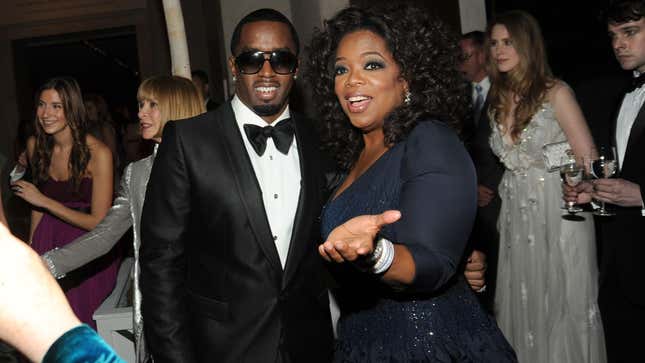
You can damn near set your watch to it: When a famous, successful Black person (usually a man) is accused of doing something heinous (usually to a woman), someone with an avatar of an African god and “3rdEye” in their screenname posts a lengthy, punctuation-free tweet or comment on how “dumb, deaf and blind” other Black folks are for supporting the always-nebulous “them/they” in “tearing down” a famous, successful Black person.
Acknowledgment of their alleged crimes and consideration for the alleged victims be damned – we’re just pawns in the white man’s machinations to destroy us all…one celebrity at a time.
Certainly, you’ve seen this brand of commenter in relation to Sean “Diddy” Combs and the Jenga tower of allegations he’s endured since Cassie sued him last November. Perhaps there exists a cabal of shadowy, leathery whites in a Manhattan penthouse who decided to push a big red button on Diddy because he wanted to buy Tubi or something. But considering he’s starting to collect Bill Cosby numbers of allegations, it’s exceedingly unlikely that everyone is lying despite his insistence that it’s all a “witch hunt.”
The “Conspiracy against Blacks” contingent is annoying, but they represent a broader psychological concern that many other Black folks also harbor: Our fear of losing the handful of icons we have.
Sure, there are countless famous Black folks, but how many Black icons exist? We’re talking household names that your grandma and 8-year-old niece can evoke. Diddy – the man responsible for Bad Boy, Sean John, Biggie Smalls and “Dylan, Dylan, Dylan, Dylan Dylan” – is one of them.
So is Def Jam founder Russell Simmons, who just learned that he can’t hide from alleged sexual misconduct on the other side of the world. And so is Will Smith, whose attack on Chris Rock tarnished his decades-curated image for white folks, but who can never do wrong by a generation of Black people who consider him our Forever Fresh Prince.
This fear of losing icons is why many Black folks came out strong in defense of Jonathan Majors, who had all the markings of a future Black icon before his whole tide shifted about a year ago. Many ignored the pertinent details of his arrest and allegations – the belief that Grace with the Good Hair was attempting to take down a brother with limitless potential was enough for us.
It’s also arguably why we let R. Kelly’s toxicity rock in the open for decades while still sending his music to the top of the charts. Or why we still check for Kanye West music despite his left turn into the Third Reich. Neither of these former Black icons deserve the socks from our feet, but you don’t have to go far to find Black folks who staunchly defend both.
This doesn’t happen in other ethnic communities: White folks didn’t wring hands over “losing” Kevin Spacey to #MeToo. I don’t recall an outrage among the Tamil community when Aziz Ansari had to sit down a few years ago.
That we feel the need to be protective of tainted icons is, like many things, a product of white supremacy: Black success in America is historically a hard-fought achievement that we covet in a manner that our white counterparts often take for granted. Older Black folks understand this intimately.
However, the younger generation of Black souls seems less concerned with icon status, leveraging social media to ensure that even seemingly pristine Black icons are held accountable for transgressions, perceived and otherwise. For example, while Oprah Winfrey is unimpeachable in the eyes of most Gen-Xers, the TikTok generation is forcing us to reconsider her with more discriminate eyes…especially following that mess with Taraji P. Henson and “The Color Purple.”
Of course, no human is infallible, and that includes icons of all stripes. But we should never provide our collective imprimatur to celebrities with a sustained record of doing terrible and/or illegal shit in their personal lives – arguably, these people aren’t good arbiters of Black celebrity anyway. Letting Black icons go isn’t always the easiest task (I really did enjoy listening to the “Bump n’ Grind” Remix), but there are always others whom we can champion and support without feeling like we need to take a bath afterwards.
That said, here’s hoping that Denzel Washington never did or does anything to warrant letting him go, because my heart couldn’t bear it.